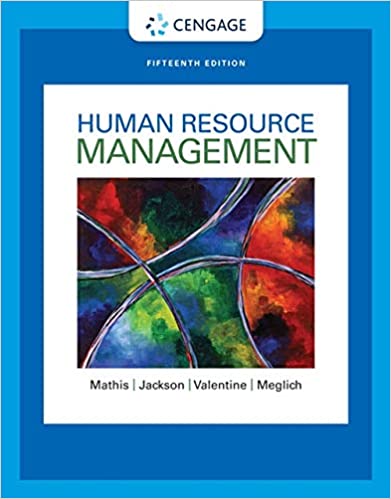
Human Resource Management 15th Edition by Robert Mathis,John Jackson,Sean Valentine ,Patricia Meglich
Edition 15ISBN: 978-1305500709
Human Resource Management 15th Edition by Robert Mathis,John Jackson,Sean Valentine ,Patricia Meglich
Edition 15ISBN: 978-1305500709 Exercise 2
"One Toke over the Line"-No Coverage for Medical Marijuana
A number of states have legalized the use of marijuana for medical purposes. Two other states, Colorado and Washington, have legalized marijuana for recreational use. These actions have fueled debates and clouded many issues about how to treat the drug for the purposes of workers' compensation. This is because the use of marijuana for any purpose, despite what state statutes allow, is still illegal under federal law.
One of the most pressing questions about medical use of the drug is who gets to pay for it in workers' compensation cases? States such as Michigan, Vermont, Colorado, and Montana have specified that insurers are not required to reimburse employees for medical marijuana, and many experts believe that this is currently the case in many others states as well, even in states that offer no legal precedence or have legalized the drug in some way. However, such an approach has been challenged and could be reviewed further in new court cases.
Employers with zero-tolerance drug policies appear to be particularly protected against reimbursement claims for medical marijuana. For instance, companies can still terminate the employment of individuals who use marijuana because federal law recognizes it as an illegal substance, even in states such as Colorado that have legalized the drug for recreational use. Courts have also generally supported an employer's right to fire employees who have used marijuana for medical purposes when the company has a zero-tolerance drug policy. However, states such as New Mexico and Rhode Island have laws in place to protect the use of medical marijuana, so HR professionals and managers should become familiar with relevant state statues.
Another challenge involves situations where employees are injured on the job and test positive for marijuana use, but the drug did not lead to the injuries. A recent case in Oklahoma determined that a worker was still entitled to workers' compensation benefits even though it was determined that he had marijuana in his system-because the drug did not contribute to his being harmed.
As a line manager or HR professional, you might have to make determinations about employee drug use and workers' compensation. You might also work for a company that has a zero-tolerance drug policy. Consequently, consider the following questions:
What should HR professionals and line managers do to better educate themselves about the impact of marijuana use on workers' compensation?
A number of states have legalized the use of marijuana for medical purposes. Two other states, Colorado and Washington, have legalized marijuana for recreational use. These actions have fueled debates and clouded many issues about how to treat the drug for the purposes of workers' compensation. This is because the use of marijuana for any purpose, despite what state statutes allow, is still illegal under federal law.
One of the most pressing questions about medical use of the drug is who gets to pay for it in workers' compensation cases? States such as Michigan, Vermont, Colorado, and Montana have specified that insurers are not required to reimburse employees for medical marijuana, and many experts believe that this is currently the case in many others states as well, even in states that offer no legal precedence or have legalized the drug in some way. However, such an approach has been challenged and could be reviewed further in new court cases.
Employers with zero-tolerance drug policies appear to be particularly protected against reimbursement claims for medical marijuana. For instance, companies can still terminate the employment of individuals who use marijuana because federal law recognizes it as an illegal substance, even in states such as Colorado that have legalized the drug for recreational use. Courts have also generally supported an employer's right to fire employees who have used marijuana for medical purposes when the company has a zero-tolerance drug policy. However, states such as New Mexico and Rhode Island have laws in place to protect the use of medical marijuana, so HR professionals and managers should become familiar with relevant state statues.
Another challenge involves situations where employees are injured on the job and test positive for marijuana use, but the drug did not lead to the injuries. A recent case in Oklahoma determined that a worker was still entitled to workers' compensation benefits even though it was determined that he had marijuana in his system-because the drug did not contribute to his being harmed.
As a line manager or HR professional, you might have to make determinations about employee drug use and workers' compensation. You might also work for a company that has a zero-tolerance drug policy. Consequently, consider the following questions:
What should HR professionals and line managers do to better educate themselves about the impact of marijuana use on workers' compensation?
Explanation
Federal laws of US has declared the usag...
Human Resource Management 15th Edition by Robert Mathis,John Jackson,Sean Valentine ,Patricia Meglich
Why don’t you like this exercise?
Other Minimum 8 character and maximum 255 character
Character 255


